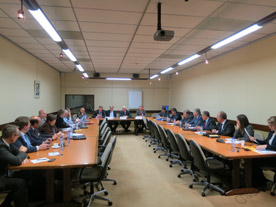Russian parliamentarians meet top officials at NATO Headquarters
Members of the Russian State Duma and Federation Council talked to senior NATO officials about NATO’s current agenda and its relations with Russia during a visit to NATO Headquarters on Tuesday 21 May. The parliamentarians, who are members of the Russian delegation to the NATO Parliamentary Assembly (NPA), had just attended the spring session of the NPA in Luxembourg.

NATO Deputy Secretary General Ambassador Alexander Vershbow opened the meeting. He has a longstanding, personal association to the development of NATO-Russia relations, having helped prepare the ground for the signing of the NATO-Russia Founding Act 16 years ago in May 1997.
“It is important to understand NATO’s basic rationale for our engagement with Russia,” said Ambassador Vershbow. “From the very beginning it was – and still is today – a sincere effort to forge a strategic partnership between Russia and NATO – a partnership where we build security together and not against each other, and not just for ourselves, but for the entire Euro-Atlantic area.”

Pointing to the strengthening of political dialogue and practical cooperation since the creation of the NATO-Russia Council in 2002, he highlighted in particular cooperation between Russia and the Alliance in combating terrorism, various projects aimed at advancing the shared goal of a stable and secure Afghanistan, and working together to counter piracy off the Horn of Africa.
The Deputy Secretary General acknowledged that Russia and the Allies do not agree on each and every issue but emphasised that “there is a genuine willingness to understand each other’s positions and look for common ground where we differ.”
Ambassador Vershbow highlighted the potential for developing a truly strategic partnership, especially by cooperating on missile defence. “We have seen what we can achieve when we work together on areas where we share the same goal – tangible security benefits and increased confidence and trust in each other.”
A busy programme provided the parliamentarians with an opportunity to talk to some of NATO’s most senior officials about key items on NATO’s current agenda, including its current and future mission in Afghanistan, missile defence, and the Alliance’s relations with Russia and countries in Central Asia and the South Caucasus.
The group also had a round-table discussion with the senior diplomatic representatives to NATO of Germany, Poland and the United States.
